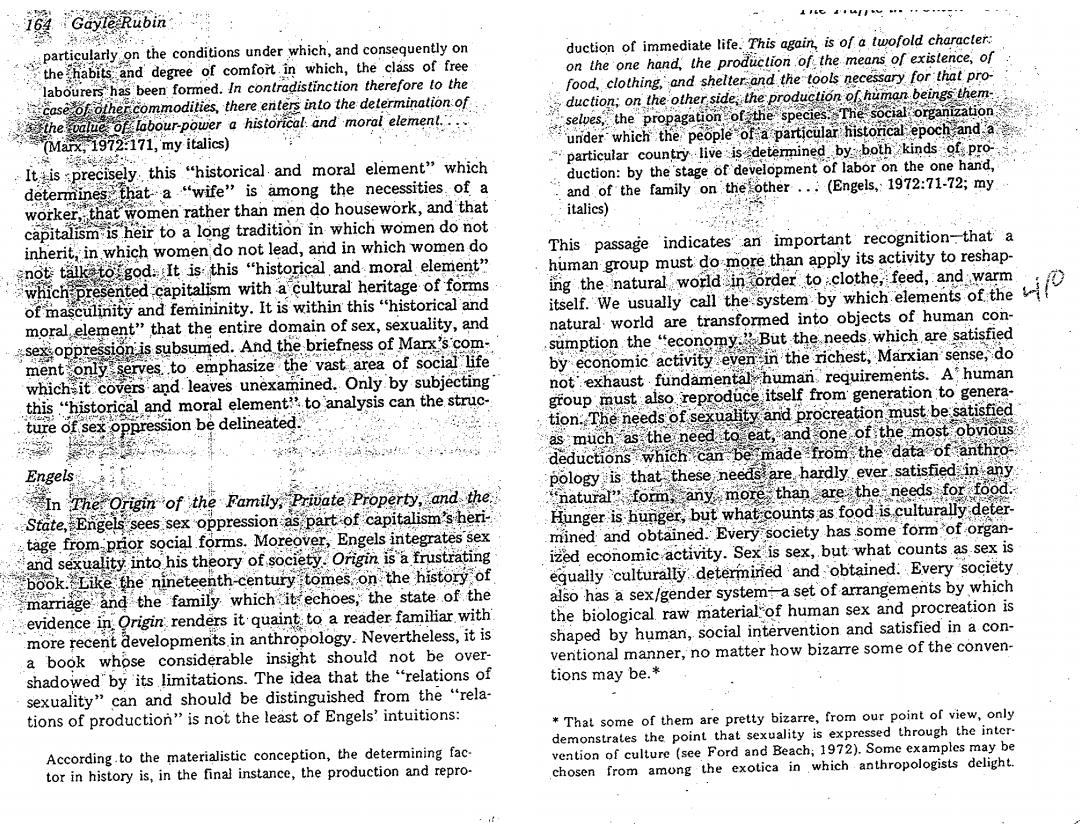正在加载图片...

Gayle Rubin 光: particularlyon the conditions under which,and consequently on duction of immediate life.This again,is of a twofold character: thehabits and degree of comfort in which,the class of free on the one hand,the production of the means of existerice,of labourers has been formed.In contradistinction therefore to the food,clothing,and sheltersand the tools necessary for that pro- case fother commodities,there enters into the determination of duction;on the other side the production of himan beings them- theoalue of labour-power a historical,and moral element. selves,the propagation of the species The social organization (Max 1972:171,my italics) under which the people of a particular historical epoch and a particular country live is determined byboth kinds of pro- Itis precisely this "historical.and moral element"which duction:by the stage of development of labor on the one hand, determines that a"wife"is among the necessities of a and of the family on thetother..:(Engels,:1972:71-72;my workerthat women rather than men do housework,and that italics) capitalism is heir to a long tradition in which women do not inherit,in which women do not lead,and in which women do This passage indicates"an important recognition-.that a not:talksto god:It is:this "historical and moral element" human group must do more than apply its activity to reshap- which presented capitalism with a cultural heritage of forms ing the natural world in torder to:clothe,feed,and warm of masculinity and femininity.It is within this"historical and itself.We usually call the system by which.elements of the H moral,element"that the entire domain of sex,sexuality,and natural.world are transformed into objects of human con- sexoppression is subsumed.And the briefness of Marx'scom- sumption the "economyBut the needs which are satisfied ment only serves.to emphasize the vast area of social life by economic activity even in the richest,Marxian sense,do whichsit covers and leaves unexamined.Only by subjecting not exhaust fundamentalhuman.requirements.A human this"historical and moral element?to analysis can the struc- group must also reproduce itself from generation to genera- ture of sex oppression be delineated. tion:The needs of sexuality and procreation must be satisfied as:much as the need to eat,and one of the most obvious deductions which:can be made from the data of anthro- Engels pology is that these needs are hardly ever satisfied in any In The Origin of the Family,Private Property,and the naturalform,any more than are the needs for food. .State,Engels sees sex oppression as part of capitalism's heri Hunger is hunger,but what counts as food is culturally deter- tage from prior social forms.Moreover,Engels integrates sex mined and obtained.Every society has some form of organ- and sexuality into his theory of society.Origin is a frustrating ized economic activity.Sex is sex,but what counts as sex is book.Like the nineteenth-century tomes.on the history of equally culturally.determined and obtained.Every society marriage and the family which it echoes,the state of the also has a sex/gender system a set of arrangements by which evidence in Origin renders it quaint to a reader familiar with the biological raw material of human sex and procreation is more recent developments in anthropology.Nevertheless,it is shaped by human,social intervention and satisfied in a con- a book whose considerable insight should not be over- ventional manner,no matter how bizarre some of the conven- shadowed'by its limitations.The idea that the "relations of tions may be. sexuality"can and should be distinguished from the "rela. tions of production"is not the least of Engels'intuitions: That some of them are pretty bizarre,from our point of view,only demonstrates the point that sexuality is expressed through the inter. According.to the materialistic conception,the determining fac- vention of culture (see Ford and Beach;1972).Some examples may be tor in history is,in the final instance,the production and repro- chosen from among the exotica in which anthropologists delight